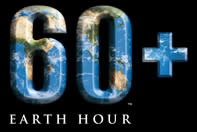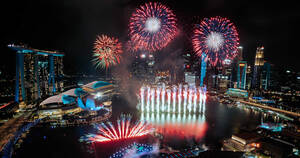![]()
Oh no, the deal has ended
Don't miss out again, get the latest news via
![]()
| Starts | 26 Mar 2011 (Sat) (ONE day only) | ||
|---|---|---|---|
| Location | Not Specified |
 We are now on Telegram. Click to join We are now on Telegram. Click to join |
 Earth Hour 2011 Singapore will take place at 8.30pm, Saturday, 26 March 2011.
Earth Hour 2011 Singapore will take place at 8.30pm, Saturday, 26 March 2011.
Earth Hour’s global switch off to highlight momentous action for earth
The annual ‘lights out’ event led by World Wide Fund for Nature (WWF) – Earth Hour 2011 – prepares to showcase a growing Singaporean community committed to taking environmental actions that go beyond the hour.
From its inception as a single-city initiative in 2007, Earth Hour has grown into a global movement where hundreds of millions of people from every continent join together to acknowledge the importance of protecting our planet.
WWF will ask individuals, businesses and governments the world over to do more to the annual switch off by showcasing how they are taking action to preserve their environment on an ongoing basis.
For Earth Hour 2011, WWF Singapore will encourage the Singaporean community, businesses and the government to:
- Switch off lights for Earth Hour at 8.30pm, Saturday, 26 March 2011 and celebrate Singapore’s commitment to the planet with the people of the world.
- Take actions beyond the hour – Save energy in daily life by keeping air-conditioning temperature set at 25oC.
“2011 will mark the third year of Earth Hour in Singapore. The growing support that we have been receiving over the past two years is a demonstration of people’s concern for our planet,” said Amy Ho, Managing Director, WWF Singapore.
“In 2011, let’s transform this demonstration into a commitment and embrace sustainable change, not just for an hour once a year, but as a long term action. There are many ways Singaporeans can make a difference. It can start with actions as simple as setting the air conditioning temperature at 25oC but that can go a long way in preserving our environment”, adds Amy Ho.
Early 2011, WWF Singapore will kick off a campaign encouraging individuals, businesses and organisations to pledge to keep their air conditioning temperature set at 25oC.
Globally, WWF will also launch a platform enabling participants worldwide to pledge for long-term action and share stories of what they are doing to make a real difference to their environment in the year ahead, showing that, no matter how big or small, together our actions add up.
Earth Hour 2010 was the largest voluntary action for the environment in history with lights going out across 128 countries and over 4,500 cities worldwide. Earth Hour 2011 will again see hundreds of millions of people across all continents come together to celebrate an unambiguous commitment to the planet by switching off their lights for one designated hour.
The countdown to Earth Hour 2011 has begun, the iconic ‘lights out’ event that has seen some of the world’s most recognised landmarks, such as the Forbidden City, Eiffel Tower, Golden Gate Bridge, and our well-loved Singapore icons including The Merlion, The Fullerton Hotel, Singapore Flyer and Esplanade Theatres on the Bay switch off for one hour in a global celebration of the one thing that unites us all – the planet.
About Earth Hour
Earth Hour is a global initiative led by WWF. Individuals, businesses, governments and communities are invited to turn out their lights for one hour on Saturday, 26 March 2011 at 8:30pm to show their support for environmentally sustainable action.
The event began in Sydney in 2007, when two million people switched off their lights. By 2010, Earth Hour had created history as the largest voluntary action ever witnessed with participation across 128 countries and every continent, including the world’s most recognised man-made marvels and natural wonders in a landmark environmental action.
About WWF
WWF – World Wide Fund for Nature, is one of the world’s largest and most respected independent conservation organisations, with almost five million supporters and a global network active in more than 100 countries.
WWF’s mission is to stop the degradation of the planet’s natural environment and to build a future in which humans live in harmony with nature, by conserving the world’s biological diversity, ensuring that the use of renewable natural resources is sustainable, and promoting the reduction of pollution and wasteful consumption.








Leave a Reply